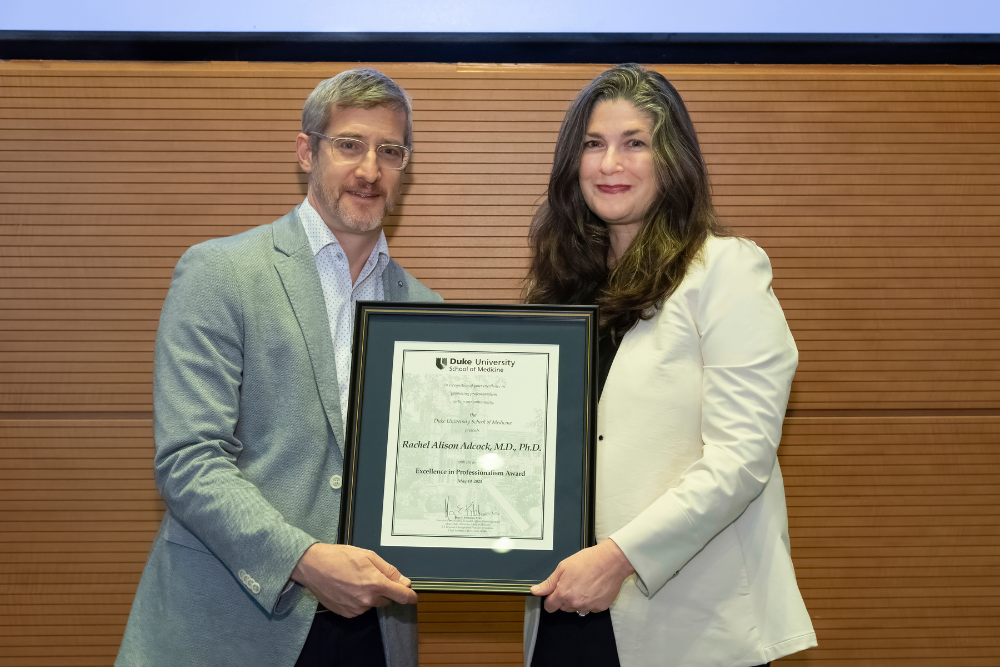Check out our news archive below to learn more about what’s happening in Duke Psychiatry & Behavioral Sciences!
How to Turn Down the Noise and Turn Up Your Well-Being
Silence can have a profound effect on mental and physical health. Intentionally adding silence to your day by purposefully stepping away and tuning out the cacophony of physical and digital noise that surrounds can have great benefits. Duke Psychiatry's Moria Smoski, PhD, shared her expertise in this Working@Duke story.
Court-Ordered Assisted Outpatient Treatment Improved Outcomes in People with ‘Serious Mental Illness’
A recent study suggests court-ordered Assisted Outpatient Treatment (AOT) programs for people with serious mental illness are associated with better treatment adherence, less violent and suicidal behavior, and reduced hospitalization and homelessness. The study was co-authored by Jeff Swanson, PhD, and Marvin Swartz, MD, of Duke Psychiatry.
R. Alison Adcock Receives SOM Professionalism Award
R. Alison Adcock, MD, PhD, associate professor of psychiatry and behavioral sciences, received the Duke University School of Medicine’s Excellence in Professionalism Award. This award recognizes faculty members who exemplify professionalism and personify Duke’s guiding principles.
Helping Young Adults Move Forward After Cancer
At 34, Iris Bugbee juggled cancer treatment, work, and motherhood—leaving little time to heal. A support program at Duke Cancer Institute is changing that, helping young cancer survivors regain strength, and reclaim their future.
Duke Psychiatry Faculty Research Highlighted in Million Veteran Program Video Series
Thanks to 1,000,000+ veterans in the Million Veteran Program (MVP), Veterans Affairs (VA) researchers—including Duke Psychiatry's Jean Beckham, PhD, and Nathan Kimbrel, PhD—are helping to change the future of mental health care for veterans. Beckham and Kimbrel recently contributed to a video series that highlighted personal stories and experiences from veterans and how researchers are using MVP's data to advance mental health research.
NCCU Students Describe Duke Internships as Empowering, Inspiring
As part of the thriving collaboration between Duke University and North Carolina Central University, three NCCU students recently completed internships facilitated and managed by the Duke-NCCU Bridge Office, housed within Duke CTSI. The scholars, who made up the fourth cohort of NCCU students to intern with Duke Psychiatry & Behavioral Sciences, presented on their internship experiences during the program’s closing ceremony in April.
Gulf War Illness Linked to Suicidal Thoughts among Veterans
A recent study published in the Journal of Psychiatric Research revealed a concerning link between Gulf War Illness (GWI) and suicidal thoughts and behaviors among veterans who served in the Persian Gulf War. Researchers found that Gulf War veterans experiencing GWI are significantly more likely to report suicidal ideation and behaviors than those who don’t have GWI. Duke Psychiatry's Nathan Kimbrel, PhD, was the study's senior author.
Jeannie Beckham Receives Barnwell Award for Veteran Research
Jeannie Beckham, PhD, professor in psychiatry and behavioral sciences, received the 2025 John B. Barnwell Award—the Veterans Affairs Office of Research & Development’s highest honor for outstanding achievement in clinical science. The award is given in recognition of scientific contributions that change clinical practice for veterans.
ArtVentures at the Nasher: Photo Story
On Sunday, March 9, the Duke Center for Autism and Brain Development collaborated with Duke University's Nasher Museum of Art to host a sensory-friendly event for local families, where children made crafts and took tours of the galleries led by Nasher staff. This story illustrates through photos what a great time was had by all.
Incarcerated Individuals and Those with Recent Criminal-Legal Involvement Report Significantly Higher Rates of Mental Health Diagnoses than other Community Members
A new national epidemiological survey provides a demographic and diagnostic picture of people living with mental ill health in prison, those with criminal legal involvement in the last year, and those with no criminal legal history in the last year—finding significantly higher rates of five mental health conditions in incarcerated individuals and individuals with recent criminal legal history. The results are described in a study published on April 9 by Duke Psychiatry's Jeffrey Swanson, PhD, and colleagues.









